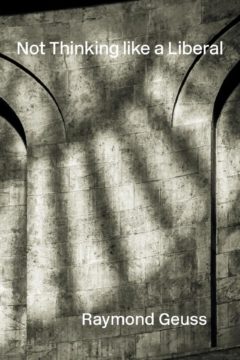Richard Eldridge in the Los Angeles Review of Books:
 Psychically, Geuss argues, liberalism offers “the fantasy of being an entirely sovereign individual” as “a reaction to massive anxiety about real loss of agency in the world.” It offers the false security of “living in a bubble of nostalgia” for the international economic hegemony that the United States began to lose from the mid-1960s onwards, first as other economies recovered from the devastations of World War II and then with increasing globalization, job flight, Trumpism, and Brexit. In this situation, liberalism “responds in a particularly satisfactory way to deep human needs and to the vested interests of powerful economic and social groups.”
Psychically, Geuss argues, liberalism offers “the fantasy of being an entirely sovereign individual” as “a reaction to massive anxiety about real loss of agency in the world.” It offers the false security of “living in a bubble of nostalgia” for the international economic hegemony that the United States began to lose from the mid-1960s onwards, first as other economies recovered from the devastations of World War II and then with increasing globalization, job flight, Trumpism, and Brexit. In this situation, liberalism “responds in a particularly satisfactory way to deep human needs and to the vested interests of powerful economic and social groups.”
How, then, did Geuss manage to escape it? Born in 1946 and raised outside Philadelphia as the son of a devout Catholic steelworker, young Raymond was sent at the age of 13 as a scholarship student to Devon Preparatory School, a boarding school run by Hungarian priests (émigrés from the failed 1956 Hungarian Revolution), members of Order of the Pious. Unusually, and unlike the schools of the Jesuits, the school was non-Thomist, antiliberal, and nonauthoritarian. Students were instructed to think for themselves, all the while understanding that the resources available for thought were the fruits of complex religious, linguistic, and social traditions within which they lived, and that they were themselves more than likely to be sinful in one way or another. Above all, “illusions of purity, absolute autonomy, and self-dependence” were taken to be “ungrounded […] sinful […] expressions of human pride.” Religious beliefs were not matters of taste, opinion, decision, or otherwise things at one’s individual command.
More here.
